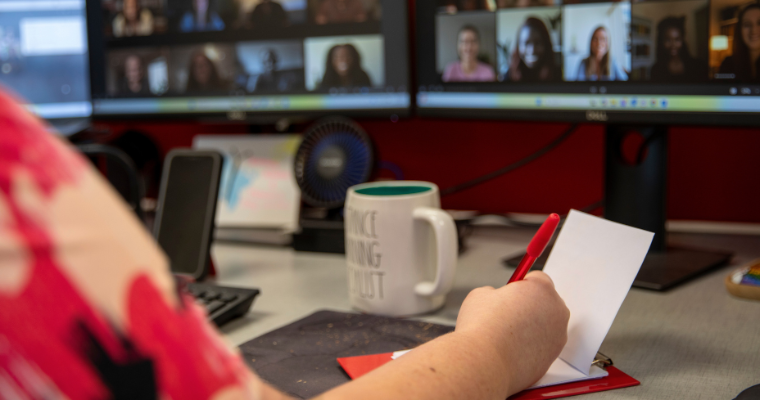Your Survival Guide to Online Proctored Exams

Your laptop’s charged. Your notes are reviewed. You’re ready to take your exam.
Until you realize there’s one more step: the proctor.
Proctored exams are a standard part of online learning at the University of Louisiana at Lafayette. While they might sound daunting, they’re really designed to protect you and keep the testing process fair.
How It Works
Before your test, you’ll connect with a live proctor. They will confirm your identity, check your testing space, and stay online through the exam.
“In a standard classroom, students would be monitored by the instructor. But in an online dynamic, they can't do that,” says Mike Williams, instructional technologist with the Office of Distance Learning.
“A proctored exam allows students to be monitored using an online webcam and proctor, so test security can be maintained.”
Most UL Lafayette online courses use ProctorU, a live online proctoring service. You’ll access it through a link in your Moodle course, which signs you in and connects you to your exam. First-time users will create an account and schedule their testing appointment.
Be sure to pay attention to the testing window. If your exam window is 10 a.m. to 2 p.m. and you start at 1:30 p.m., you’ll have just 30 minutes before it's closed.
5 Ways to Make Test Day a Breeze
Williams works with online students daily and says a few steps can prevent most problems faced during proctored exams.
1. Prepare Early
Take a few minutes to review the proctor guide so you know what to expect.
Your proctor will ask to see your testing space on camera. That means clearing your desk and going in a quiet, private spot where no one will disturb you.
“Make sure you know what to expect, and you’re not just showing up and hoping for the best,” Williams says.
2. Check Your Tech
Your computer setup can make or break your test.
“It shouldn’t be a mobile device or iPad,” Williams says. “It must be a desktop or laptop computer that’s a newer model — four years old at the most. Older than that, students run into problems.”
Google Chrome and Firefox are the preferred browsers to use for the test. Make sure they are up to date.
ProctorU has equipment testing procedures. Students should run that test on the computer they intend to use well before their testing appointment.
If you can, plug in with wired internet instead of Wi-Fi. It’s more stable and less likely to cut out mid-test.
3. Review the Exam Rules
Confirm your exam rules before test day.
Can you use your notes? What about your textbook? It depends on the course, so make sure you know what’s allowed before you log in.
4. Pick the Right Spot
Choose your testing spot wisely. Public spaces like coffee shops or bookstores aren’t approved for proctored exams.
The best space is a quiet and private, like a study room or an office. Turn off your phone and let anyone nearby know not to disturb you.
If someone walks in during your test, your proctor has to mark it as a testing incident, so plan ahead.
5. Know What to Do if Problems Come Up
Tech isn’t perfect. If you can’t connect or something goes wrong during your exam, ProctorU support is available 24/7.
“The proctor is their friend. The proctor helps fix whatever happens during the exam, and tech support will also assist,” says Williams.
Students should email the class instructor to let them know what happened. The instructor will look into the problem in case it's happened to more than one student.
“Most issues could be avoided ahead of time with better planning,” he adds. “Have the support phone number next to you. Work with your proctor. If you need help, reach out.”
Finish your degree wherever you are with our online programs.


